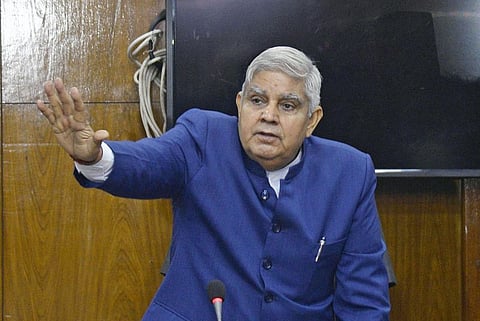The fall of a loyalist: Why India’s Vice-President Jagdeep Dhankar had to resign
Behind resignation of Dhankar lies a deeper story of party control, constitutional erosion

When the Vice-President of India suddenly resigned last week, it took everyone by surprise, not least the media which had absolutely no idea that something so big was brewing. On the very first day of the Monsoon session of parliament, in a letter to the President, Jagdeep Dhankar cited health reasons for stepping down but it was quite clear that this was not the case.
Within hours, BJP leaders were feeding stories to the media about why the government was upset with Dhankar. He was going to allow an opposition sponsored impeachment motion against a judge, he gave the opposition too much time on the floor of the house, he was rude to ministers, he wanted his portrait to be hung in government offices, he wanted a Mercedes car - the list of allegations is a long one and reads like a chargesheet.
Series of events
On the day of his resignation, a series of events seem to have been the final straw. That includes Dhankar allowing the leader of the opposition in the Rajya Sabha, Mallikarjun Kharge, to speak at length on the Pahalgam terror attack while cutting off the BJP’s J.P. Nadda, who got so furious that he was visibly angry. BJP leaders have been telling journalists that Dhankar’s attacks against the judiciary - of which there were many in the last year - were getting increasingly uncomfortable for the government.
Dhankar has not broken his silence yet - and we don’t know if he will - but his exit shows how everyone, even the most loyal soldiers, are expendable and dispensable for the BJP. As West Bengal Governor, Dhankar was constantly at loggerheads with Chief Minister Mamata Banerjee, crossing the red lines that Governors should adhere to. He blocked bills passed by the assembly and was openly critical of the ruling Trinamool Congress.
As Vice-President and Chairman of the Rajya Sabha, he undermined the dignity of his post with his openly partisan behaviour. He did not allow discussions that would make the BJP uncomfortable such as the farmer protests. He described the opposition’s stand as “crocodile tears”. Opposition MPs were suspended from the House and Dhankar would often berate opposition leaders. He also praised the RSS openly. It got so bad that last December, opposition leaders came together and brought in a proposal to remove him - the first time this has happened.
Following the playbook
By all accounts therefore, Jagdeep Dhankar was acting from the BJP playbook, doing pretty much what the ruling party desired and not hiding it. Today, it is the BJP government that has ensured Dhankar’s unceremonious exit while it is the opposition which is asking what really caused him to step down. But what should be a bigger concern is how a constitutional office has been so blatantly undermined by the ruling party which apparently got so angry with Dhankar for giving space to opposition leaders that it forced the Vice-President out of office. Some reports say the BJP had begun collecting the signatures of its MPs to move an impeachment motion against Dhankar before he got wind of it and resigned.
We are also told in the latest press reports that Dhankar was privately criticising the government in meetings with opposition leaders and others, conversations that travelled back to the top leadership. The bottomline is that the Modi government is only happy to have those who toe the line in important constitutional posts. Anyone who thinks independently, or follows the letter of the law, will find themselves out in the cold. The BJP believed that by making him Vice-President, Jagdeep Dhankar still had to put party above all else. The moment he started thinking a little differently, he got into trouble. The question is - where does all of this leave constitutional autonomy and integrity in our democracy? No one in the media is making these questions. The compromise of these institutions has been normalised to an alarming level. And that is not good for democracy, not good for India.
Sign up for the Daily Briefing
Get the latest news and updates straight to your inbox








